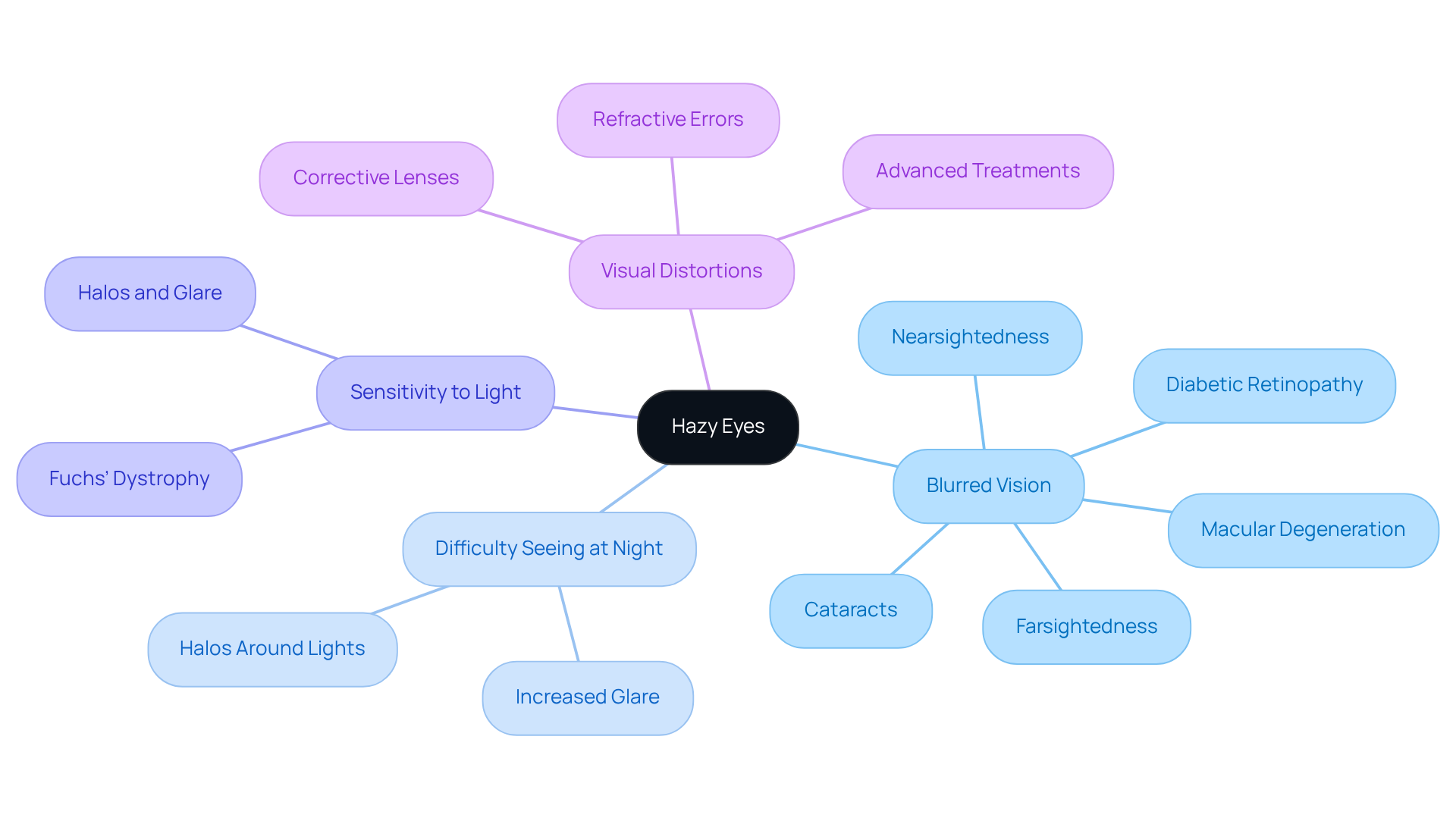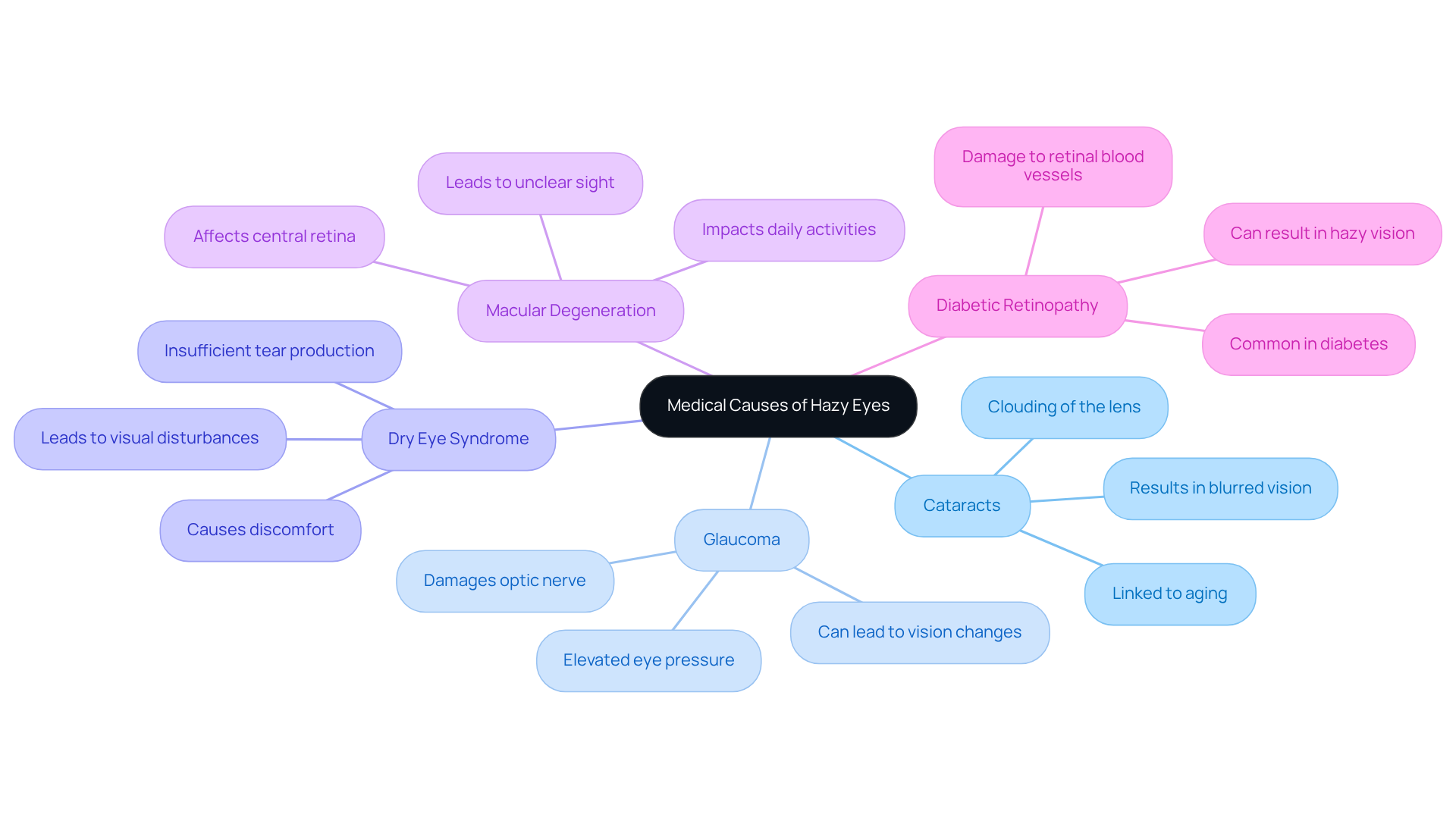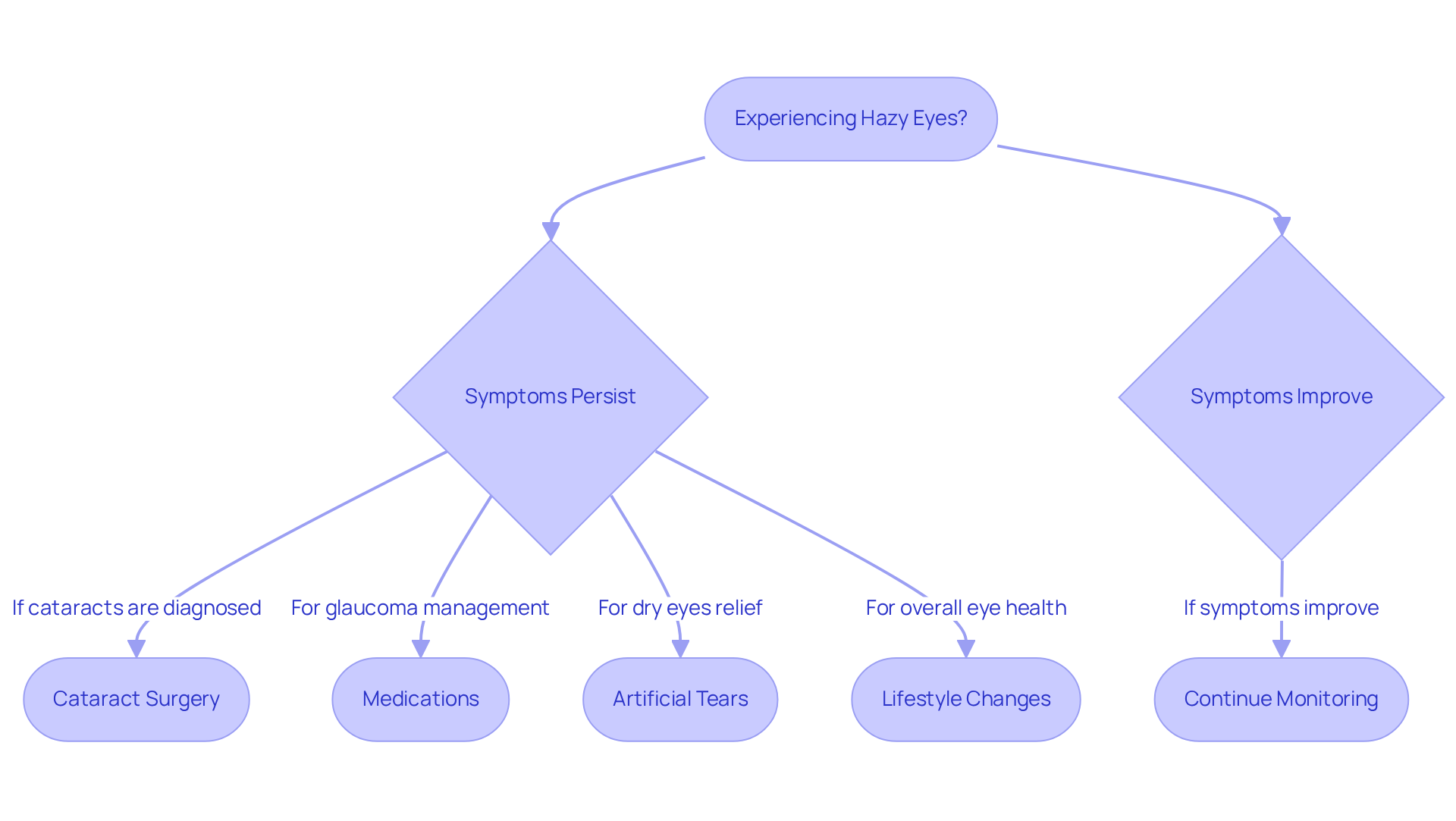Posted by: Northwest Eye in General on November 13, 2025
Introduction
Hazy eyes can often signal underlying health issues, leaving you feeling anxious about your vision. We understand that this can be unsettling. It’s crucial to recognize the various causes, symptoms, and potential solutions if you’re experiencing this phenomenon. Conditions like cataracts and diabetic retinopathy are just a few examples, and the importance of early intervention cannot be overstated.
What steps can you take to regain clarity and ensure optimal eye health amidst these challenges? Remember, you’re not alone in this journey. Many have faced similar concerns and found reassurance through understanding their options.
We are here to help you through this process, providing the support and information you need to navigate these challenges with confidence.
Define Hazy Eyes: Symptoms and Initial Considerations
Hazy eyes can be concerning, often presenting as a cloudiness or blurriness in your sight. We understand how unsettling this can feel. Here are some common symptoms you might experience:
- Blurred Vision: You may notice that objects appear fuzzy or out of focus. This can stem from conditions like nearsightedness, farsightedness, or cataracts. Sometimes, having hazy eyes can also indicate eye diseases such as diabetic retinopathy or macular degeneration.
- Difficulty Seeing at Night: If you find it hard to see clearly in dim lighting, you’re not alone. This can lead to increased glare and halos around lights, making nighttime driving particularly challenging.
- Sensitivity to Light: It’s common to feel discomfort in bright environments. Conditions like Fuchs’ Dystrophy can heighten this sensitivity, often accompanied by halos and glare.
- Visual Distortions: You might notice that straight lines appear wavy or bent. This could suggest refractive errors that might benefit from corrective lenses or advanced treatments.
As you navigate these symptoms, consider how long they’ve been present and if you’re experiencing any additional signs, like eye pain or redness. These could indicate a more serious issue that needs prompt attention. For those dealing with cataracts, exploring innovative solutions like the Light Adjustable Lens (LAL) can provide personalized sight correction, enhancing your visual clarity and overall quality of life. Remember, we are here to help you through this process.

Explore Medical Causes of Hazy Eyes: From Cataracts to Glaucoma
It’s important to understand that several medical conditions can lead to hazy eyes, so you can take the right steps for your health. Here are some common causes:
- Cataracts: This condition involves a clouding of the eye’s lens, often linked to aging, which can result in blurred or hazy vision.
- Glaucoma: Elevated pressure in the eye can damage the optic nerve, leading to changes in your sight that may be concerning.
- Dry Eye Syndrome: When your eyes don’t produce enough tears, it can cause discomfort and visual disturbances that can be frustrating.
- Macular Degeneration: This affects the central part of the retina, leading to unclear sight that can impact daily activities.
- Diabetic Retinopathy: If you have diabetes, damage to the blood vessels in the retina can result in hazy eyes, which is something to monitor closely.
We understand that dealing with these conditions can be overwhelming. Comprehending these factors is essential for knowing when to seek medical guidance. Remember, the cornea plays a crucial role in your eye health by focusing light onto the lens and filtering harmful UV rays, which can help protect against some of these conditions.
It’s also worth noting that blocked tear ducts can contribute to unclear sight, as they may lead to insufficient moisture on the eye’s surface. This further emphasizes the importance of maintaining overall eye health. We are here to help you through this process, ensuring you feel supported every step of the way.

Implement Solutions: Treatment Options and When to Seek Help
We understand how concerning hazy eyes can be, and treatment options may vary depending on the underlying cause. Here’s a look at some options that might help:
-
Cataract Surgery: If cataracts are diagnosed, surgical intervention can restore clarity by replacing the cloudy lens with an artificial one. Over 90% of cataract patients would recommend the procedure, and more than 90% report improved vision after the operation, with many noticing significant enhancements within just a week. Cataracts are the leading cause of blindness globally, accounting for 39% of moderate to severe visual impairment in 2025. This highlights the importance of seeking timely treatment when experiencing hazy eyes.
-
Medications: For conditions like glaucoma, prescription eye drops can help manage intraocular pressure. Effective treatment is crucial, as studies suggest that prompt intervention can prevent loss of sight.
-
Artificial Tears: If you’re dealing with dry eyes, over-the-counter lubricating eye drops can provide relief, easing discomfort and improving clarity of sight.
-
Lifestyle Changes: Regular eye exams, staying hydrated, and maintaining a balanced diet rich in vitamins A, C, and E can support your overall eye health. The risk of cataracts increases significantly with age, making these practices essential for preserving your vision.
When to Seek Assistance: If your vision remains unclear, worsens, or is accompanied by severe symptoms like sudden vision loss, eye discomfort, or headaches, it’s important to seek medical care promptly. Early intervention can be critical in preventing further complications. Remember, we are here to help you through this process.

Preventive Measures for Eye Health
To maintain optimal eye health and prevent conditions that may lead to hazy eyes, we understand that you might have concerns. Here are some caring measures to consider:
-
Regular Eye Exams: It’s important to schedule comprehensive eye exams at least once a year. These routine examinations can catch potential issues early, identifying conditions like cataracts and glaucoma before they significantly affect your vision.
-
Protective Eyewear: We recommend using sunglasses that block 99 to 100% of UV-A and UV-B rays. Protecting your eyes from harmful sun exposure is crucial. Studies show that over 20% of cataracts worldwide are linked to excessive UV exposure, highlighting the importance of protective eyewear in reducing this risk.
-
Healthy Lifestyle: Maintaining a balanced diet rich in fruits, vegetables, and omega-3 fatty acids is essential for your eye health. Regular exercise and avoiding smoking can also significantly lower your risk of developing eye diseases.
-
Manage Chronic Conditions: It’s common to feel overwhelmed when managing chronic conditions like diabetes and hypertension. However, keeping these under control can prevent sight deterioration. For instance, 90% of blindness due to diabetes is avoidable with appropriate care.
-
Stay Hydrated: Remember to drink plenty of water. Staying hydrated supports overall health and helps maintain adequate tear production, which is vital for preventing dry eyes and ensuring clear vision.
We are here to help you through this process and encourage you to take these steps for your eye health.

Conclusion
Hazy eyes can really affect your daily life, often signaling underlying health issues that need attention. We understand how concerning this can be. Recognizing the causes, symptoms, and available solutions is essential for maintaining visual clarity and overall eye health. By being aware of the signs of hazy vision, you can take proactive steps toward seeking the right treatment and improving your quality of life.
This article explores various aspects of hazy eyes, including symptoms like:
- Blurred vision
- Difficulty seeing at night
- Sensitivity to light
It highlights common medical conditions such as:
- Cataracts
- Glaucoma
- Diabetic retinopathy
These conditions can lead to hazy vision. Treatment options vary, ranging from surgical interventions to lifestyle changes. Regular eye exams and protective measures are crucial to prevent further deterioration.
In conclusion, staying aware of your eye health is vital for everyone, especially if you’re experiencing symptoms of hazy vision. We encourage you to prioritize regular check-ups, adopt healthy habits, and seek timely medical advice. Taking these steps not only helps safeguard your vision against potential threats but also enhances your overall well-being. Together, we can work towards a clearer and brighter future.
Frequently Asked Questions
What are hazy eyes?
Hazy eyes refer to a cloudiness or blurriness in your sight, which can be concerning and unsettling.
What are the common symptoms of hazy eyes?
Common symptoms include blurred vision, difficulty seeing at night, sensitivity to light, and visual distortions such as straight lines appearing wavy or bent.
What causes blurred vision associated with hazy eyes?
Blurred vision can result from conditions like nearsightedness, farsightedness, cataracts, or eye diseases such as diabetic retinopathy or macular degeneration.
Why might someone experience difficulty seeing at night?
Difficulty seeing at night can lead to increased glare and halos around lights, making activities like nighttime driving particularly challenging.
What does sensitivity to light indicate?
Sensitivity to light can cause discomfort in bright environments and may be heightened by conditions like Fuchs’ Dystrophy, often accompanied by halos and glare.
What are visual distortions, and what might they suggest?
Visual distortions occur when straight lines appear wavy or bent, which could suggest refractive errors that may require corrective lenses or advanced treatments.
When should someone seek medical attention for hazy eyes?
If symptoms persist, or if there are additional signs such as eye pain or redness, it may indicate a more serious issue that needs prompt attention.
What innovative solutions are available for those dealing with cataracts?
For cataracts, innovative solutions like the Light Adjustable Lens (LAL) can provide personalized sight correction, enhancing visual clarity and overall quality of life.






